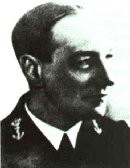Rear-Admiral Karel W.F.M. Doorman


Rear-Admiral Karel W.F.M. Doorman
Karel Willem Frederick Marie Doorman was born on April 23rd, 1889, at Utrecht and entered the Royal Netherlands Naval College in Den Helder at the age of 17.On August 24th, 1910, he became an officer and after serving on various ships, in the Far East as well as in the Netherlands, he went in August 1915 to the air division of the Navy at Soesterberg. In 1921, he attended a staff course at the naval staff college in the Hague. Then there followed several postings: at the naval department in Batavia, on board the armoured ship De Zeven Provincien and on the naval staff in the Hague. He served as a commanding officer on board destroyers and cruisers.
From August 17th, 1938 until May 16th, 1940, he was in command of the Royal Netherlands Naval Air Service in the East Indies, while on the latter date he was promoted to the rank of Rear-Admiral and appointed commander of the Netherlands Squadron in the East. Considering Doorman had earned his wings as a young officer and had a very close connection with the naval air service, he can undoubtedly be qualified as being "air-minded" and must have been aware of the importance of an adequate air reconnaissance. Doorman was always asking for assistance from aircraft and, during the last staff conference on February 26th, 1942, he told the Naval Commander Surabaya that he sincerely hoped he could rely on the necessary information and assistance from the air. Fate would have it otherwise; there were just no aircraft available.
Furthermore, the aeroplane from the USS cruiser Houston was left behind in Surabaya as one prepared for a night action. Doorman was a very special and very difficult man, not only to others, but also to himself. He had a tropical illness which sometimes caused him much inconvenience, and which would not have made it easier for him to carry the weighty responsibility of uniting a Striking Force, which moreover changed its formation several times. Yet, it was his leadership and stubborn determination which nevertheless made this Striking Force an effective force. When the flagship was fatally hit by a Japanese torpedo Doorman and his staff could have left the ship, as there was sufficient time to get into the boats, but instead he chose to go under with the Dutch light cruiser De Ruyter.

